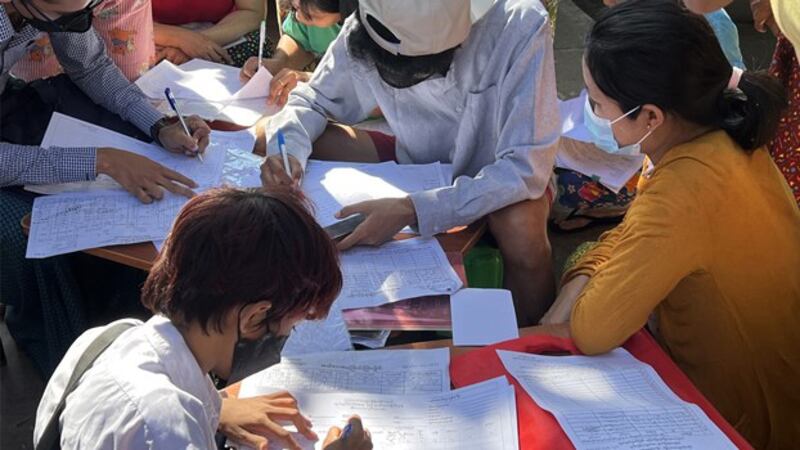With the junta’s extension of a national state of emergency in Myanmar, it has become increasingly uncertain whether the regime will hold general elections as it previously pledged, political analysts and election observers said.
Nearly a year has passed since Senior Gen. Min Aung Hlaing, chairman of the State Administration Council, the junta’s governing body, planned to hold an election. The general led the February 2021 coup d'état that seized power from the democratically elected government on the grounds of election fraud.
Results showed that the National League for Democracy, or NLD, had won Myanmar’s 2020 general election with more than 80% of the vote.
Min Aung Hlaing extended emergency rule in Myanmar for another six months on July 31, thereby delaying the date by which elections must be held according to the country’s constitution.
Previously, the junta said it planned to hold elections by August.
The military leader has said that he would hold elections and hand over power to the winning party, but the state of emergency that allows him to rule the country has been extended repeatedly.
Fierce fighting
Analysts say there is little chance of holding elections wracked by fighting – in Sagaing, Magway, Bago and Tanintharyi regions as well as in Kayin, Kayah, Chin and Mon states.
Myint Htwe, a National League for Democracy lawmaker from Ye-U township in Sagaing region, told RFA that the junta is citing the country’s instability due to the fighting as an excuse to not hold elections and to continue its rule.
Western governments and international rights groups say that any election held under the junta is unlikely to be free or fair.
Though the ruling military council considers holding elections as a political exit for the junta, it will not solve Myanmar’s current situation of turmoil and fighting wracking the country, said San Aung, executive director of the New Myanmar Foundation, an election monitoring group.
“Since they have already announced that an election would be held, they will try to hold one as a political exit, but if they think it won’t politically benefit them much, then they won’t,” he said.
“But the political solution for the current situation is not an election,” added San Aung, a former minister of health and education. “It is through dialogue and political negotiations.”

Census incomplete
Neither the junta nor the shadow National Unity Government that emerged after the coup have discussed holding political negotiations.
Because of nationwide armed resistance to the junta, officials have not been able to complete a census – a major step in preparation for an election — though the regime claims it completed a count of 90% of Myanmar's populations of roughly 54 million people, RFA reported in June.
In the meantime, Min Aung Hlaing mentioned two possible election scenarios at a July 31 meeting of the National Defense and Security Council.
The first is to hold elections nationwide, while the second is to hold elections only in areas the military controls and to exclude politically unstable regions and states.
The military commander-in-chief did not decide on one or the other, but rather concluded his speech by saying that security must be increased throughout the country.
At a military council meeting in Naypyidaw on Aug. 7, Min Aung Hlaing said the 2023 election could be delayed if peace and law and order are disturbed.
‘Political exit’
Aung Moe Zaw, chairman of the Democratic Party for a New Society, which opposed the military coup by not re-registering under the junta’s new Political Parties Registration Act, said the military council could try to continue to hold power instead of holding elections. The act applies to political parties that wish to contest in 2023 elections, and those that fail to register are automatically de-registered or excluded from participating.
“They will hold an election at some point to try to make themselves legitimate at least to be recognized by neighboring countries and to make a good impression internationally,” said Aung Moe Zaw. “That is their political exit.”
As a consequence of staging the military coup, the junta has not been allowed to attend ministerial-level meetings of the Association of Southeast Asian Nations, or ASEAN, and is under sanctions from the European Union and the United States.
The Union Election Commission under the junta also dissolved the NLD in March after its leadership chose not to re-register under the new registration law.
Aye Maung, chairman of the Arakan Front Party, said the junta appears to be trying to stabilize the country to hold voting within the next six months, in part by shifting around cabinet leaders earlier this month.
“We cannot hold an election without creating a peaceful environment,” he said, adding that the junta may extend the state of emergency in another six months if there is no stability at that time. “The election is [Min Aung Hlaing’s] ultimate goal.”
The junta leader said that he would set aside six months to prepare for the election after the initial yearlong state of emergency the military declared following the coup and the two previous six-month extensions.
As of July 27, the junta’s Union Election Commission has allowed 30 political parties to re-registered under the new law and five new ones to register for the elections.
Translated by Myo Min Aung for RFA Burmese. Edited by Roseanne Gerin and Malcolm Foster.
